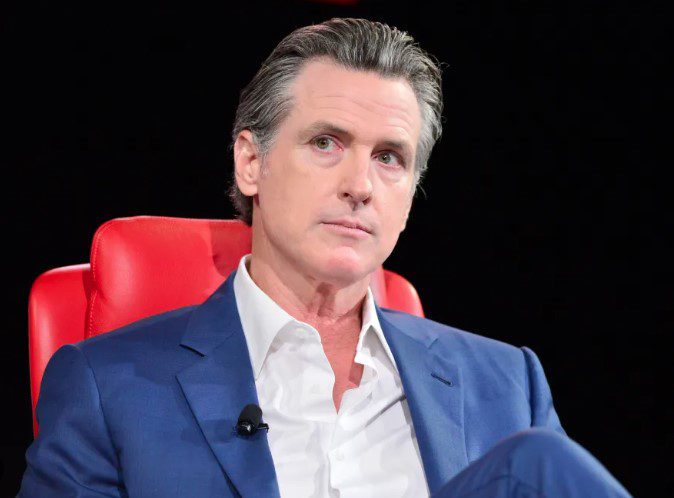California Governor Gavin Newsom issued a veto of a bill that would have allowed victims of violent online threats to hold social media companies legally responsible. The bill, known as Senate Bill 771, aimed to impose strict penalties on platforms that facilitated criminal or hateful language through their algorithms.
Newsom Calls Bill Premature Despite Rising Online Threats
Governor Newsom, a Democrat, explained his decision in a letter to the state Senate, saying the proposal was “premature” and could put the state’s major tech companies at risk of multimillion-dollar lawsuits.
He suggested first reviewing whether existing civil rights laws are sufficient to deal with violations committed through social media platforms. “To the extent our laws prove inadequate, they should be bolstered at that time,” Newsom wrote. This veto decision highlights the governor’s cautious approach to regulating online speech.
California already allows lawsuits against individuals who post harmful or threatening content online. SB 771, however, targeted social media platforms themselves, including major companies like Meta, Google, and X, particularly those earning at least $100 million annually.
Under the bill, civil penalties could reach $1 million per threat if the platform intentionally or knowingly used algorithms to spread harmful language. Less intentional violations could have triggered penalties of $500,000.
Supporters Express Disappointment and Critics Agree with Veto
The governor’s veto drew mixed reactions. Supporters of the bill expressed disappointment, saying the legislation was a necessary step to protect vulnerable users from online harassment. Jessica Heldman, executive director of the University of San Diego School of Law’s Children’s Advocacy Institute, which had advocated for the bill, said Newsom’s veto was a setback.
“We do earnestly hope that the governor next year will propose bills on all these topics…so that no child or adult will place their lives at risk just by logging onto a computer,” Heldman said.
On the other hand, critics and libertarian groups had expected Newsom to veto the legislation. Jonathan Hofer, a research associate at the Independent Institute in Oakland, noted that the governor often vetoes bills considered redundant or overlapping with existing laws.
Gavin Newsom weaponizes crypto with “Trump Corruption Coin” in redistricting war against Trump
Some civil rights groups and child safety advocates had strongly supported SB 771, emphasizing that it aimed to punish illegal threats and harassment rather than restricting free speech. The legislation cited recent increases in hate-motivated incidents, including anti-immigrant slurs, anti-LGBTQ+ disinformation, anti-Semitism, and anti-Islamic bias, as reasons for the law.
Susan Tuchman, an attorney with the Zionist Organization of America, highlighted the risks associated with social media algorithms. “Social media companies know that their algorithms are steering their users toward extremist, hateful views and conduct on their platforms, which threaten the safety and security of Jews and others around the world,” she said.
Free Speech Concerns and Legal Challenges Highlighted
Several organizations opposed SB 771, citing concerns about free speech and the potential for frivolous lawsuits. The Computer and Communications Industry Association, representing companies like Google, Apple, and Meta, warned that the bill could stifle online expression by making social media platforms liable for content they did not create.
Similarly, the Council on American-Islamic Relations (CAIR) raised concerns that the law could be misused to suppress political criticism of Israel. Oussama Mokeddem, legislative and government affairs director for CAIR’s California chapter, said Newsom’s veto reflected an understanding that protecting citizens from hate should not infringe on constitutional speech rights.
Free speech advocacy groups also criticized the bill as unconstitutional. The Foundation for Individual Rights and Expression warned that the law could make platforms liable for “unsafe” algorithms even if they were unaware of offending content.
“Let’s have it, Joe”: Newsom publicly dares Rogan to face him in uncensored discussion
The political split on SB 771 was clear. While the Democrat-controlled Assembly and Senate passed the bill by wide margins, no Republican state lawmakers voted in favor. George Andrews, press secretary for the California State Assembly Republican Caucus, said the bill undermined free speech principles.
Even some analysts from free-market think tanks, such as Kerry Jackson from the Pacific Research Institute, questioned the rationale for Newsom’s veto, suggesting the legislation fit neatly with progressive concerns but may not have been necessary from a legal standpoint.
Governor Newsom’s veto leaves existing laws in place, which allow lawsuits against individuals making threats online but stop short of holding social media platforms themselves responsible for algorithm-driven harassment. The debate highlights ongoing tensions between protecting online users from harm and safeguarding freedom of speech in the digital age.
